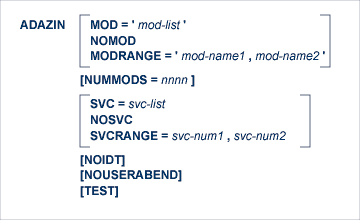
This document describes the syntax and parameters of the ADAZIN utility. All parameters are optional.
Use the MOD parameter to specify a list of load modules for which maintenance information should be printed. Module names should be separated with commas. In the following example, ADAZIN would print maintenance information for the ADAREP and ADASEL load modules only.
ADAZIN MOD='ADAREP,ADASEL'
A maximum of 255 module names can be listed in the MOD parameter.
The default is to print maintenance information about all of the load modules in the load module library. In other words, the following coding would print maintenance information about all of the load modules in the load module library:
ADAZIN
The MOD, MODRANGE, and NOMOD parameters are mutually exclusive. Only one of them may be specified in an ADAZIN run, although none of them are required.
Use the MODRANGE parameter to specify the names of the first and last load modules for which maintenance information should be printed. In addition to printing maintenance information about the load modules listed in the MODRANGE parameter, ADAZIN will print maintenance information for all of the load modules that fall alphabetically (by module name) between the two specified load modules. In the following example, ADAZIN would print maintenance information for the ADAREP and ADASEL load modules as well as for every other load module in the load library with a module name that falls alphabetically between ADAREP and ADASEL (for example, ADASAV would also be included in the report).
ADAZIN MODRANGE='ADAREP,ADASEL'
The MOD, MODRANGE, and NOMOD parameters are mutually exclusive. Only one of them may be specified in an ADAZIN run, although none of them are required.
Specify the NOIDT parameter to indicate that status information should not be printed for the BS2000 environment in which the ADAZIN run. This parameter is valid only in BS2000 environments.
Specify the NOMOD parameter to indicate that maintenance information should not be printed for load modules in the ADAZIN run.
The MOD, MODRANGE, and NOMOD parameters are mutually exclusive. Only one of them may be specified in an ADAZIN run, although none of them are required.
Specify the NOSVC parameter to indicate that status information should not be printed for any SVCs in the ADAZIN run.
The SVC, SVCRANGE, and NOSVC parameters are mutually exclusive. Only one of them may be specified in an ADAZIN run, although none of them are required.
This parameter is valid only in z/OS environments; in z/VSE and BS2000 environments, this parameter is ignored.
When a parameter error or a functional error occurs while this utility function is running, the utility ordinarily prints an error message and terminates with user abend 34 (with a dump) or user abend 35 (without a dump). If NOUSERABEND is specified, the utility will not abend after printing the error message. Instead, the message "utility TERMINATED DUE TO ERROR CONDITION" is displayed and the utility terminates with condition code 20.
Note:
When NOUSERABEND is specified, we recommend that it be specified
as the first parameter of the utility function (before all other parameters).
This is necessary to ensure that its parameter error processing occurs
properly.
Use the NUMMODS parameter to estimate the number of members in the target load libraries. Usually this parameter is optional. However, if the target load libraries contain more than 5000 members, the NUMMODS parameter must be specified.
ADAZIN uses the NUMMODS parameter to estimate the space it requires to build the library member list. If this number is too small, the list will be truncated and all modules may not be processed.
Use the SVC parameter to specify a list of SVCs for which status information should be printed. SVC numbers should be separated with commas. In the following example, ADAZIN would print status information for SVC 225 and 255 only.
ADAZIN SVC=225,255
SVC numbers must lie in the range 200 through 255, inclusive. A maximum of 56 SVC numbers can be listed in the SVC parameter.
This parameter is valid only in z/OS environments; in z/VSE and BS2000 environments, this parameter is ignored.
The default (in z/OS environments) is to print status information about all of the SVCs in use by Adabas unless parameter NOSVC is specified.
The SVC, SVCRANGE, and NOSVC parameters are mutually exclusive. Only one of them may be specified in an ADAZIN run, although none of them are required.
Use the SVCRANGE parameter to specify the first and last SVC numbers for which status information should be printed. In addition to printing status information about the SVCs listed in the SVCRANGE parameter, ADAZIN will print status information for all of the SVCs that fall numerically between the two specified SVC numbers. In the following example, ADAZIN would print status information for SVC 225 and 255 load modules as well as for every other SVC number that falls between 225 and 255 (for example, SVC 240 would also be included in the report).
ADAZIN SVCRANGE=225,255
SVC numbers must lie in the range 200 through 255, inclusive.
This parameter is valid only in z/OS environments; in z/VSE and BS2000 environments, this parameter is ignored.
The SVC, SVCRANGE, and NOSVC parameters are mutually exclusive. Only one of them may be specified in an ADAZIN run, although none of them are required.
This parameter tests the operation syntax without actually performing the operation. Only the syntax of the specified parameters can be tested; not the validity of values and variables.